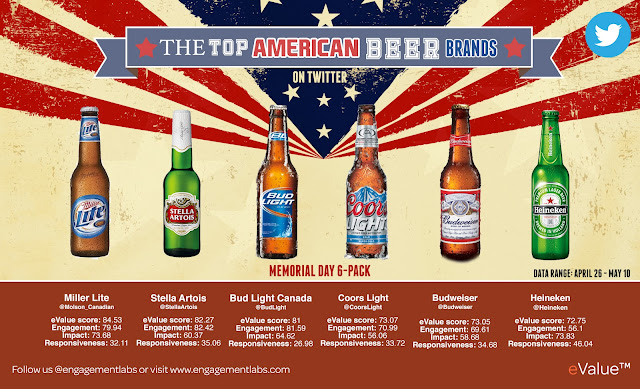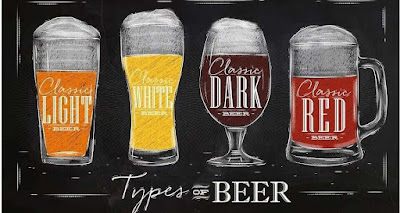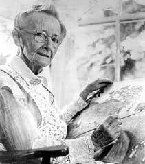
Beer is one of the oldest and most widely consumed alcoholic drinks in the world, and the third most popular drink overall after water and tea. It is produced by the brewing and fermentation of starches, mainly derived from cereal grains—most commonly from malted barley, though wheat, maize (corn), rice, and oats are also used. During the brewing process, fermentation of the starch sugars in the wort produces ethanol and carbonation in the resulting beer. Most modern beer is brewed with hops, which add bitterness and other flavors and act as a natural preservative and stabilizing agent. Other flavoring agents such as gruit, herbs, or fruits may be included or used instead of hops. In commercial brewing, the natural carbonation effect is often removed during processing and replaced with forced carbonation.
Some of humanity's earliest known writings refer to the production and distribution of beer: the Code of Hammurabi included laws regulating beer and beer parlors, and "The Hymn to Ninkasi", a prayer to the Mesopotamian goddess of beer, served as both a prayer and as a method of remembering the recipe for beer in a culture with few literate people.
Beer is distributed in bottles and cans and is also commonly available on draught, particularly in pubs and bars. The brewing industry is a global business, consisting of several dominant multinational companies and many thousands of smaller producers ranging from brewpubs to regional breweries. The strength of modern beer is usually around 4% to 6% alcohol by volume (ABV), although it may vary between 0.5% and 20%, with some breweries creating examples of 40% ABV and above.
Beer forms part of the culture of many nations and is associated with social traditions such as beer festivals, as well as a rich pub culture involving activities like pub crawling, pub quizzes and pub games.
Beer is one of the world's oldest prepared alcoholic drinks. The earliest archaeological evidence of fermentation consists of 13,000-year-old residues of a beer with the consistency of gruel, used by the semi-nomadic Natufians for ritual feasting, at the Raqefet Cave in the Carmel Mountains near Haifa in Israel. There is evidence that beer was produced at Göbekli Tepe during the Pre-Pottery Neolithic (around 8500 BC to 5500 BC). The earliest clear chemical evidence of beer produced from barley dates to about 3500–3100 BC, from the site of Godin Tepe in the Zagros Mountains of western Iran. It is possible, but not proven, that it dates back even further—to about 10,000 BC, when cereal was first farmed. Beer is recorded in the written history of ancient Iraq and ancient Egypt, and archaeologists speculate that beer was instrumental in the formation of civilizations. Approximately 5000 years ago, workers in the city of Uruk (modern day Iraq) were paid by their employers with volumes of beer. During the building of the Great Pyramids in Giza, Egypt, each worker got a daily ration of four to five litres of beer, which served as both nutrition and refreshment that was crucial to the pyramids' construction.
As of 2007, the brewing industry is a global business, consisting of several dominant multinational companies and many thousands of smaller producers ranging from brewpubs to regional breweries. As of 2006, more than 35 billion US gallons, the equivalent of a cube 510 meters on a side, of beer are sold per year, producing total global revenues of US$294.5 billion. In 2010, China's beer consumption hit 45 billion liters, or nearly twice that of the United States, but only 5 per cent sold were premium draught beers, compared with 50 per cent in France and Germany.
A recent and widely publicized study suggests that sudden decreases in barley production due to extreme drought and heat could in the future cause substantial volatility in the availability and price of beer.
The history of breweries in the 21st century has included larger breweries absorbing smaller breweries in order to ensure economy of scale. In 2002, South African Breweries bought the North American Miller Brewing Company to found SABMiller, becoming the second largest brewery, after North American Anheuser-Busch. In 2004, the Belgian Interbrew was the third largest brewery by volume and the Brazilian AmBev was the fifth largest. They merged into InBev, becoming the largest brewery. In 2007, SABMiller surpassed InBev and Anheuser-Bush when it acquired Royal Grolsch, brewer of Dutch premium beer brand Grolsch in 2007. In 2008, when InBev (the second-largest) bought Anheuser-Busch (the third largest), the new Anheuser-Busch InBev company became again the largest brewer in the world.
As of 2020, according to the market research firm Technavio, AB InBev remains the largest brewing company in the world, with Heineken second, CR Snow third, Carlsberg fourth, and Molson Coors fifth.
We've got two questions for you. Are you tired of dry baked chicken? And who doesn't love reaching into a bag of potato chips? Well, we've got a recipe that's the best of both worlds. Make our Barbecue Chip Chicken! Barbecue chips add an irresistible crunch and tangy flavor to juicy baked chicken breasts. Try this new chicken for dinner, tonight - it won't disappoint!
- 1/2 cup ranch salad dressing
- 1 teaspoon garlic powder
- 1/4 teaspoon cayenne pepper
- 1 (6-ounce) bag barbecue-flavored potato chips, crushed
- 4 boneless, skinless chicken breast halves (1 to 1-1/2 pounds)
- Preheat oven to 400º. Coat a rimmed baking sheet with cooking spray.
- In a shallow dish, combine dressing, garlic powder, and cayenne pepper; mix well. Place crushed potato chips in another shallow dish. Dip chicken into dressing mixture then into crushed potato chips, coating completely; place on baking sheet.
- Bake 15 to 20 minutes or until chicken is no longer pink.
- To make it easier to dip our Barbecue Chip Chicken in our favorite dipping sauces, we cut the chicken into long strips and turn them into chicken fingers.
1908 – Michael DeBakey, American cardiac surgeon
1923 – Peter Lawford, British-born American actor (d. 1984)
1954 – Corbin Bernsen, American actor

















No comments:
Post a Comment